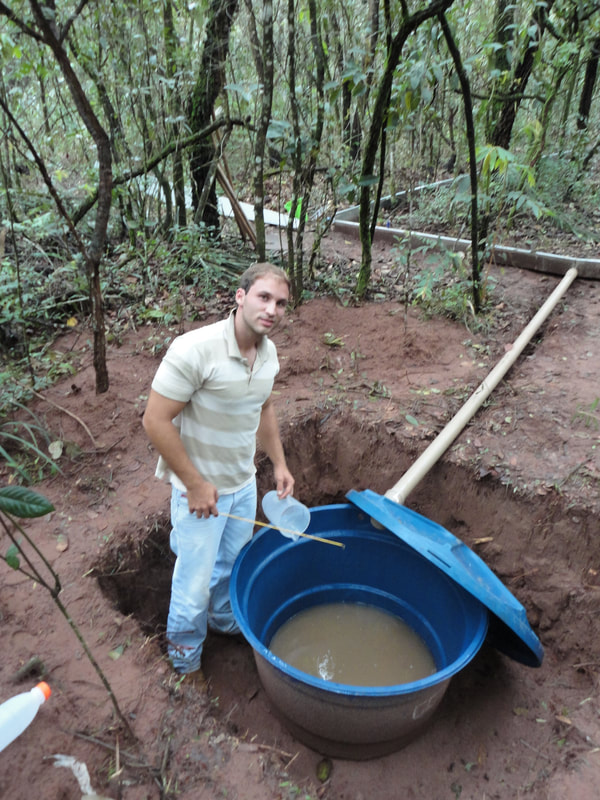In my vision, ecohydrology is a way to better understand the environmental systems dynamics, where hydrological and ecological processes are investigated by an interdisciplinary and integrated approaches. Water is the link between such processes, in which hydrological processes influence and provide feedbacks on the aquatic and terrestrial ecosystem dynamics and vice versa. Furthermore, human activities have altered the ecosystems and water fluxes; therefore, a better comprehend of ecohydrology is crucial to help us to keep a balance between the water-related uses and consequently the human life.
What are your undergraduate and graduate degrees in?
I was born in Brazil in 1985 and received both my BSc degree in Environmental Engineering (2009) and MSc degrees in Water Resources (2011) at the Federal University of Mato Grosso do Sul (UFMS), Campo Grande - MS, Brazil.
My Ph.D. in Science - Hydraulics and Sanitary Engineering was obtained in 2014 at the University of São Paulo (USP), São Carlos - SP, Brazil. I also worked as a visiting researcher (2013-2014) at the United States Department of Agriculture (USDA-SWRC) and at the University of Arizona, Tucson, AZ, USA.
How did you arrive at working in/thinking about ecohydrology?
When I was a child, I usually spent all holidays on my grandfather’s farm. In the back of the farm’s house there is a stream that for several years was used to generate energy (small-scale hydropower) and where my dad and uncles learned to swim. However, the small-scale hydropower stopped working and I could not swim in this stream because the streamflow was too low, the sediment transport compromised the water channel, and the water quality was not good. Thus, like as any child I asked several questions for my dad, such as: Why can’t I swim? What is going on with the water? Why is the stream too shallow? This has never left my mind!! During my PhD I could study and respond to all of these questions, and I can say I did it studying ecohydrology. One of the main goals of my thesis was to obtain a better understanding of the mechanisms of hydrological and soil erosion processes approaching aspects of the relationship among hydrology, human activities, and the environment. To achieve that, I worked with different scales (plots, watershed and continental) and data sources (experimental field, laboratory, and remote sensing).
What do you see as an important emerging area of ecohydrology?
I consider an important emerging area is to better understand ecohydrological processes, and its response to changes, in different spatial-temporal scales. For instance, in a recent study we found a water provisioning improvement in a tropical watershed through payment for ecosystem services based on soil and water conservation practices and vegetation recovery. However, we need to know if the same approach can work in a similar way for different spatial scales (local-regional-continental), climate, and vegetation conditions.
In addition, more investigations are needed considering a catchment coevolution approach, where we can investigate how climate, soils, vegetation, and topography have coevolved during the past and how they might do so in the future. This approach is important to explain catchment's features and functions, and to evaluate the most vulnerable and resilient catchments considering global or regional changes.
Another emerging area that I can point out is an ecohydrological approach with solutions to guarantee the food-energy-water-ecosystem security. It is motived because global population have grown and changed the standards of living promoting an increase of the demand for clean water, food, and energy to unprecedented levels. In addition, we have grappled each year across the globe with the climate change effects, mainly longer-term droughts and more-intense floods. Therefore, new insight in ecohydrology will be needed toward a better solution for these challenges.
Do you have a favorite ecohydrology paper? Describe/explain.
It’s really hard to pick just one. I can cite important ecohydrology papers for me, such as: Rodriguez‐Iturbe (2000), Rodriguez‐Iturbe et al (2009); Newman et al (2006), among others. However, I would like to highlight here the papers by Orellana et al (2012) and Troch et al. (2013). The first one, is a great review paper providing the state of knowledge on groundwater‐dependent vegetation. This paper helped me to understand how groundwater levels might determine vegetation composition/density or vice versa. The second one, shows a strong interaction between climate, vegetation and soil properties that lead to specific hydrologic partitioning at the catchment scale. I like this paper because it helps us summarize different catchment features in a simple and predictable outcome of hydrological partitioning. This paper is really useful to understand past and future catchment coevolution and it is a theme that I currently study.
What do you do for fun (apart from ecohydrology)?
It is a good question; I can say that it has been changed during my life. Some years ago, I could say that it is working out, running, swimming, playing soccer, or any other sport... However, currently with two little daughters (Marina: 2 years and half; Milena: 23 days) my life is much busier, but sweeter and fun. Now , I spend my free time with my wife and daughters doing kids things, e.g. playing dolls, swimming sometimes (Brazil is really hot), and visiting parks or playgrounds!

 RSS Feed
RSS Feed